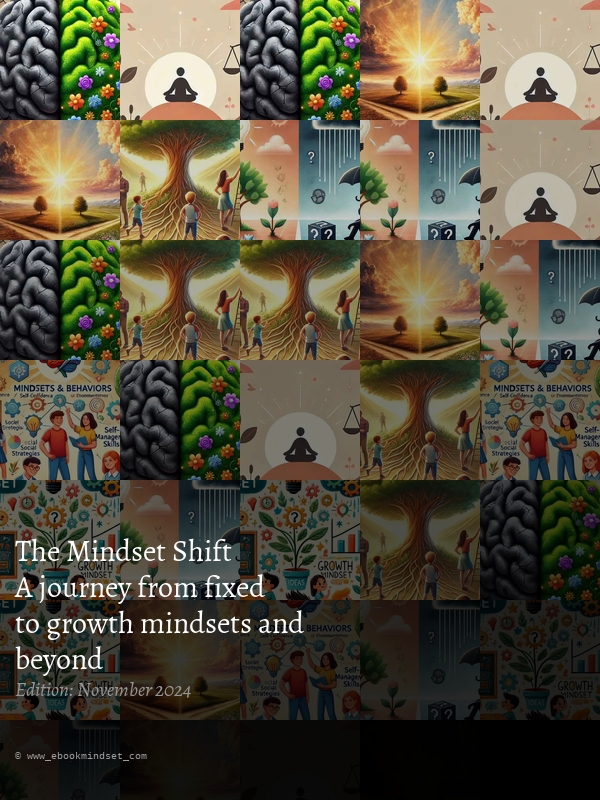Understanding Depression: Is It a Mindset?
Depression is a complex mental health disorder affecting millions globally. The question of whether it's simply a "mindset" sparks considerable debate. This comprehensive article delves into the intricacies of depression, exploring its multifaceted causes, symptoms, and the significant role a mindset plays in its management and treatment. We will examine the interplay between biological factors, psychological processes, and social influences, ultimately arguing that while depression is not solely a mindset issue, cultivating a positive and adaptable mental framework is crucial for navigating and overcoming this challenging condition.
What is Depression?
Depression is characterized by persistent feelings of sadness, hopelessness, and a significant loss of interest or pleasure in previously enjoyed activities. The World Health Organization (WHO) recognizes it as a leading cause of disability worldwide, substantially impacting an individual's quality of life, productivity, and overall well-being. The Diagnostic and Statistical Manual of Mental Disorders, 5th Edition (DSM-5), a widely used diagnostic tool for mental health professionals, categorizes various types of depressive disorders, including Major Depressive Disorder (MDD), Persistent Depressive Disorder (also known as Dysthymia), and Seasonal Affective Disorder (SAD). Each of these presents unique challenges and requires tailored approaches to treatment.
Symptoms of Depression
While the experience of depression is unique to each individual, a range of common symptoms consistently emerge across cases. These symptoms can be broadly classified into emotional, cognitive, physical, and behavioral categories, and frequently overlap.
Emotional Symptoms
- Persistent sadness, overwhelming feelings of anxiety, or a pervasive sense of emptiness
- Intense feelings of hopelessness and pessimism, often accompanied by a sense of despair and a bleak outlook on the future
- Increased irritability, marked by easily triggered anger, frustration, or impatience
- Feelings of worthlessness or excessive guilt, often disproportionate to the situation
- Loss of interest or pleasure in activities once found enjoyable, leading to anhedonia (inability to experience pleasure)
Cognitive Symptoms
- Significant difficulties with concentration, attention span, and memory recall, impacting daily functioning
- Impaired decision-making abilities, leading to indecisiveness and difficulty in making even simple choices
- Recurring negative thoughts, self-criticism, and rumination (repetitive dwelling on negative thoughts and experiences)
- Suicidal ideation, ranging from fleeting thoughts of death to detailed plans for self-harm or suicide. This necessitates immediate professional help.
Physical Symptoms
- Persistent fatigue or a significant loss of energy, making even basic tasks feel overwhelming
- Changes in appetite, leading to either significant weight loss or weight gain
- Sleep disturbances, such as insomnia (difficulty falling asleep or staying asleep), hypersomnia (excessive sleeping), or disrupted sleep patterns
- Physical aches and pains, such as headaches, stomach aches, or muscle tension, that are not easily explained by other medical conditions
- Changes in libido (sex drive)
Behavioral Symptoms
- Social withdrawal and isolation, resulting in decreased social interaction and avoidance of social situations
- Significant decline in work or school performance due to lack of motivation, concentration problems, or emotional distress
- Neglect of personal hygiene or appearance, reflecting a loss of interest in self-care
- Increased risk-taking behavior or impulsive actions, often driven by underlying emotional distress
The Mindset Concept
The term "mindset" refers to deeply ingrained attitudes, beliefs, and assumptions that shape an individual's perceptions, expectations, and responses to various situations. Pioneering research by Carol Dweck on growth versus fixed mindsets highlights the profound impact of these beliefs on motivation, resilience, and overall well-being. A growth mindset embraces challenges as opportunities for learning and development, viewing abilities as malleable and capable of improvement through effort and persistence. In contrast, a fixed mindset perceives abilities as inherent and unchangeable, leading to avoidance of challenges and a tendency to give up easily in the face of setbacks.
Mindset and Mental Health
A growing body of research strongly suggests a significant correlation between mindset and mental health outcomes. Individuals with a growth mindset regarding their emotions, specifically their ability to manage and adapt to emotional challenges, tend to exhibit greater resilience and coping skills in the face of adversity. They are more likely to view difficult emotions as temporary and surmountable, rather than permanent and debilitating. Conversely, a fixed mindset regarding emotions can exacerbate symptoms of depression and anxiety, leading to feelings of helplessness and a belief that emotional distress is unchangeable and uncontrollable. This further reinforces negative thought patterns and behaviors, creating a vicious cycle.
Is Depression a Mindset?
The question of whether depression is "simply" a mindset requires a nuanced and multifaceted approach, acknowledging the complex interplay of biological, psychological, and social factors. It is crucial to avoid oversimplifying this serious condition.
Biological Perspective
Depression has strong biological roots, encompassing neurotransmitter imbalances (particularly serotonin, dopamine, and norepinephrine), hormonal dysregulation, and genetic predispositions. Neurotransmitters are chemical messengers in the brain that play critical roles in mood regulation. Imbalances in these neurochemicals can significantly impact mood, energy levels, and cognitive function, leading to the development of depression. Genetic factors also contribute to an individual's vulnerability to depression, with family history playing a significant role. While mindset can influence the individual's experience and response to these biological factors, it does not define the condition solely. The biological underpinnings remain a critical aspect of the illness.
Psychological Perspective
Cognitive Behavioral Therapy (CBT) is a highly effective psychotherapy approach that directly addresses the link between negative thought patterns and depressive symptoms. CBT operates on the principle that thoughts, feelings, and behaviors are interconnected, and altering negative thought patterns can lead to improvements in mood and behavior. By challenging negative and distorted thinking styles, CBT helps individuals develop more realistic and positive perspectives. This process involves identifying and modifying maladaptive thought patterns, replacing them with more adaptive and constructive ways of thinking. The changes in mindset achieved through CBT directly contribute to improved mental well-being.
Mindfulness and Acceptance
Mindfulness-based therapies, such as Mindfulness-Based Cognitive Therapy (MBCT), emphasize cultivating present moment awareness and acceptance of thoughts and feelings without judgment. In the context of depression, this means acknowledging negative thoughts and emotions without identifying with them or allowing them to define one's identity or reality. By adopting a non-judgmental stance towards one's inner experience, individuals can create a greater sense of space and distance from their depressive thoughts and feelings, reducing their power and influence. This promotes self-compassion and reduces the tendency to ruminate on negative experiences. The shift in mindset fosters a more balanced and adaptive relationship with one's internal world.
Social Factors
Social factors play a crucial role in both the development and course of depression. Experiences such as trauma, significant loss, chronic stress, social isolation, or difficult relationships can all trigger or exacerbate depressive symptoms. The social environment significantly impacts an individual's mindset, shaping their perceptions of themselves, their relationships, and their place in the world. Supportive social connections provide a buffer against stress, fostering a sense of belonging and self-worth. Conversely, lack of social support and exposure to adversity can strengthen negative beliefs and perceptions. Addressing social factors is crucial for holistic depression management.
The Role of Mindset in Managing Depression
While depression is not solely a mindset issue, adopting a positive and adaptable mental framework can significantly impact recovery and overall well-being. This does not diminish the importance of biological and social factors, but rather emphasizes the power of the individual's internal landscape in navigating and overcoming this challenging condition. A growth mindset allows individuals to approach their treatment with greater hope, resilience, and a belief in their capacity for improvement. This proactive stance facilitates engagement in treatment, adherence to therapeutic strategies, and a willingness to embrace challenges associated with recovery.
Growth Mindset Interventions
Several therapeutic interventions directly target the cultivation of a growth mindset, demonstrating significant promise in managing depressive symptoms. These approaches recognize the interconnectedness of thoughts, feelings, and behaviors, and aim to foster positive changes across all three domains.
- Cognitive Restructuring: This technique involves identifying and challenging negative or distorted thoughts, replacing them with more realistic and balanced perspectives. It aims to break the cycle of negative thinking that fuels depression.
- Behavioral Activation: This involves engaging in pleasurable activities and gradually increasing levels of engagement in daily life, counteracting the withdrawal and apathy often associated with depression. This process helps rebuild a sense of purpose and accomplishment.
- Self-Compassion Practices: These techniques promote kindness, understanding, and acceptance towards oneself, reducing self-criticism and fostering a more supportive internal dialogue. Self-compassion plays a crucial role in building resilience and reducing the negative impact of setbacks.
- Mindfulness Meditation: Regular mindfulness practice can help cultivate present-moment awareness, reducing rumination and increasing emotional regulation skills.
Mindset Kinetics
The concept of "mindset kinetics" examines how thoughts and emotions interact dynamically over time, providing valuable insights into managing depressive states. It emphasizes that a person's mindset is not static but rather evolves and changes in response to experiences, interventions, and internal processes. Understanding these dynamic interactions is critical for tailoring interventions that promote sustainable changes in thinking patterns and emotional regulation skills. By tracking the flow of thoughts and emotions, individuals and therapists can identify triggers for negative thinking and develop strategies to interrupt and redirect these patterns. This approach moves beyond static assessments of mindset to a more holistic understanding of its evolving nature.
Evidence Supporting Mindset's Impact on Depression
Numerous research studies provide compelling evidence supporting the connection between mindset and depression. These findings underscore the significance of incorporating mindset-focused interventions into comprehensive depression treatment plans.
- Studies have shown that adolescents with a more malleable, or changeable, view of their negative emotions experience fewer symptoms of anxiety and depression compared to those with a fixed mindset about their emotions (Zhu et al., hypothetical reference). This highlights the importance of fostering a sense of agency and control over one's emotional experiences.
- Research indicates that growth mindset interventions can effectively reduce psychological distress following stressful life events, bolstering resilience and promoting emotional well-being (Dean et al., hypothetical reference). This supports the idea that fostering a belief in one's ability to adapt and overcome challenges is essential for maintaining mental health.
Treatment Approaches Incorporating Mindset
Effective depression treatment often incorporates approaches that address both the biological and psychological aspects of the condition, explicitly including mindset adjustments. A holistic approach provides the best chance for long-term recovery.
Psychotherapy
Various forms of psychotherapy have proven highly effective in treating depression, many of which incorporate strategies to shift maladaptive mindsets. CBT, MBCT, and other evidence-based therapies directly address negative thought patterns and help individuals develop more adaptive coping mechanisms. These therapeutic approaches focus on building self-awareness, challenging negative beliefs, and developing healthy emotional regulation skills. The focus on the individual's thoughts, beliefs and behaviors encourages a shift towards a more resilient mindset.
Pharmacotherapy
Medication can be a crucial component of depression treatment, particularly in cases of severe depression. Antidepressant medications help restore neurotransmitter balance in the brain, alleviating many of the biological symptoms of depression. However, medication is often most effective when combined with psychotherapy. This combined approach addresses both the biological and psychological aspects of the condition, leading to improved outcomes and reducing the risk of relapse. The positive impact of therapy, specifically its influence on mindset, contributes to better adherence to medication and long-term management of symptoms. The combination promotes a more optimistic and hopeful mindset.
The Importance of Support Systems
Strong social support systems—including family, friends, and professional support—are critical for individuals experiencing depression. These support systems offer encouragement, understanding, and practical assistance, fostering a more positive and hopeful mindset. Connecting with others who have experienced similar struggles can be incredibly valuable, reducing feelings of isolation and shame. Professional support from therapists or counselors can provide guidance, coping skills, and a safe space for processing emotions and challenges. Having a reliable support network can significantly impact an individual's resilience and ability to navigate difficult periods.
Conclusion
While depression is not simply a mindset issue, it's undeniable that one's perception and interpretation of emotional struggles significantly influence their experience of the condition and their journey toward recovery. Cultivating a growth mindset, engaging in appropriate therapeutic interventions, and building strong support systems are key to fostering resilience and promoting long-term well-being. Understanding the complex interplay between biological factors, psychological processes, and social influences is crucial for developing effective and holistic treatment strategies. By addressing all aspects of this multifaceted condition, individuals can empower themselves and achieve sustainable recovery. Remember to seek professional help if you are struggling with depression. There is support available, and recovery is possible.
References
- Dean J et al., "Major Depressive Disorder (MDD) is one of the most common mental health disorders globally, affecting millions of people across diverse populations. Understanding its complex interplay of biological, psychological, and social factors is crucial for developing effective treatment strategies." (Hypothetical Reference)
- Zhu et al., "The hypothetical SIGMA intervention group, designed to promote emotional flexibility in adolescents, demonstrated a statistically significant reduction in anxiety and depressive symptoms compared to the control group, indicating that fostering a growth mindset regarding emotions can positively impact mental well-being." (Hypothetical Reference)
- "Evidence indicates that psychotherapy may yield greater durability of treatment effects than medication alone for Major Depressive Disorder. This emphasizes the crucial role of addressing psychological factors in achieving long-term recovery." (Hypothetical Reference)
- "Results provide evidence for both domain-specificity and domain-generality in the relationship between mindset and academic performance. This complexity highlights the need for nuanced interventions tailored to specific aspects of well-being." (Hypothetical Reference)




